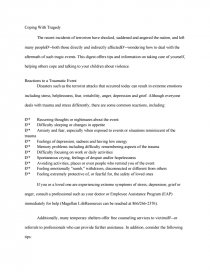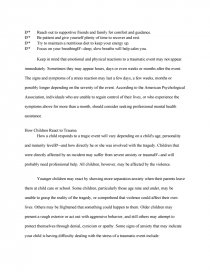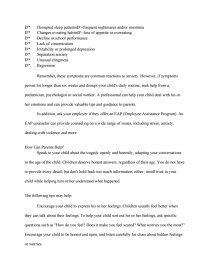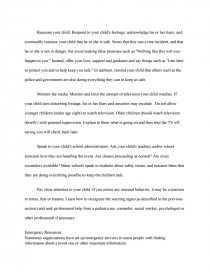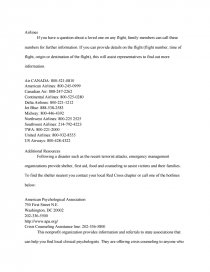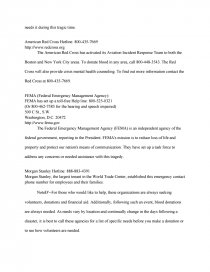Coping with Grief
Essay by review • February 8, 2011 • Research Paper • 1,441 Words (6 Pages) • 1,673 Views
Coping With Tragedy
The recent incidents of terrorism have shocked, saddened and angered the nation, and left many peopleÐ'--both those directly and indirectly affectedÐ'--wondering how to deal with the aftermath of such tragic events. This digest offers tips and information on taking care of yourself, helping others cope and talking to your children about violence.
Reactions to a Traumatic Event
Disasters such as the terrorist attacks that occurred today can result in extreme emotions including stress, helplessness, fear, irritability, anger, depression and grief. Although everyone deals with trauma and stress differently, there are some common reactions, including:
Ð'* Recurring thoughts or nightmares about the event
Ð'* Difficulty sleeping or changes in appetite
Ð'* Anxiety and fear, especially when exposed to events or situations reminiscent of the trauma
Ð'* Feelings of depression, sadness and having low energy
Ð'* Memory problems including difficulty remembering aspects of the trauma
Ð'* Difficulty focusing on work or daily activities
Ð'* Spontaneous crying, feelings of despair and/or hopelessness
Ð'* Avoiding activities, places or even people who remind you of the event
Ð'* Feeling emotionally "numb," withdrawn, disconnected or different from others
Ð'* Feeling extremely protective of, or fearful for, the safety of loved ones
If you or a loved one are experiencing extreme symptoms of stress, depression, grief or anger, consult a professional such as your doctor or Employee Assistance Program (EAP) immediately for help (Magellan LifeResources can be reached at 866/266-2376).
Additionally, many temporary shelters offer free counseling services to victimsÐ'--or referrals to professionals who can provide further assistance. In addition, consider the following tips:
Ð'* Reach out to supportive friends and family for comfort and guidance.
Ð'* Be patient and give yourself plenty of time to recover and rest.
Ð'* Try to maintain a nutritious diet to keep your energy up.
Ð'* Focus on your breathingÐ'--deep, slow breaths will help calm you.
Keep in mind that emotional and physical reactions to a traumatic event may not appear immediately. Sometimes they may appear hours, days or even weeks or months after the event. The signs and symptoms of a stress reaction may last a few days, a few weeks, months or possibly longer depending on the severity of the event. According to the American Psychological Association, individuals who are unable to regain control of their lives, or who experience the symptoms above for more than a month, should consider seeking professional mental health assistance.
How Children React to Trauma
How a child responds to a tragic event will vary depending on a child's age, personality and maturity levelÐ'--and how directly he or she was involved with the tragedy. Children that were directly affected by an incident may suffer from severe anxiety or traumaÐ'--and will probably need professional help. All children, however, may be affected by the violence.
Younger children may react by showing more separation anxiety when their parents leave them at child care or school. Some children, particularly those age nine and under, may be unable to grasp the reality of the tragedy, or comprehend that violence could affect their own lives. Others may be frightened that something could happen to them. Older children may present a rough exterior or act out with aggressive behavior, and still others may attempt to protect themselves through denial, cynicism or apathy. Some signs of anxiety that may indicate your child is having difficulty dealing with the stress of a traumatic event include:
Ð'* Disrupted sleep patternsÐ'--frequent nightmares and/or insomnia
Ð'* Changes in eating habitsÐ'--loss of appetite or overeating
Ð'* Decline in school performance
Ð'* Lack of concentration
Ð'* Irritability or prolonged depression
Ð'* Separation anxiety
Ð'* Unusual clinginess
Ð'* Regression
Remember, these symptoms are common reactions to anxiety. However, if symptoms persist for longer than six weeks and disrupt your child's daily routine, seek help from a, pediatrician, psychologist or social worker. A professional can help your child deal with his or her emotions and can provide valuable tips and guidance to parents.
In addition, ask your employer if they offer an EAP (Employee Assistance Program). An EAP counselor can provide counseling on a wide range of issues, including stress, anxiety, dealing with violence and more.
How Can Parents Help?
Speak to your child about the tragedy openly and honestly, adapting your conversations to the age of the child. Children deserve honest answers, regardless of their age. You do not have to provide every detail, but don't hold back too much information, either; instill trust in your child while helping him or her understand what happened.
The following tips may help:
Encourage your child to express his or her feelings. Children usually feel better when they can talk about their feelings. To help your child sort out his or her feelings, ask specific questions such as "How do you feel? Does it make you feel scared? What worries you the most?" Encourage your child to be honest and open, and listen carefully for clues about hidden feelings or worries.
Reassure your child. Respond to your child's feelings; acknowledge his or her fears; and continually reassure your child that he or she is safe. Stress that this was a rare incident, and that he or she is not in danger, but avoid making false promises such as "Nothing
...
...
